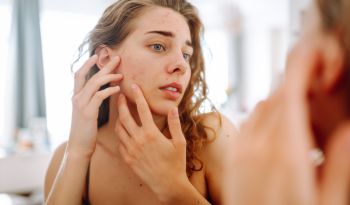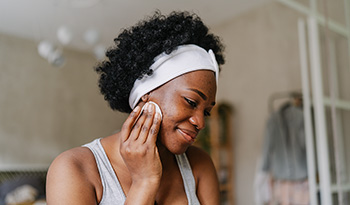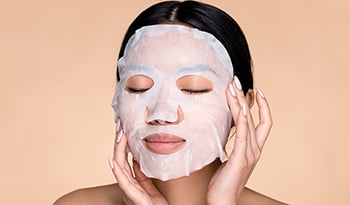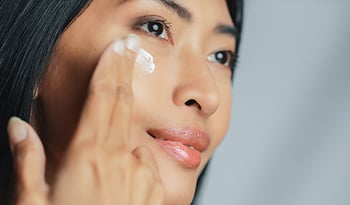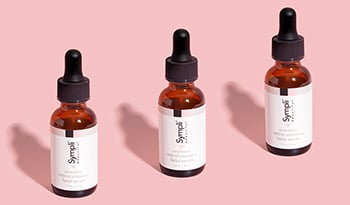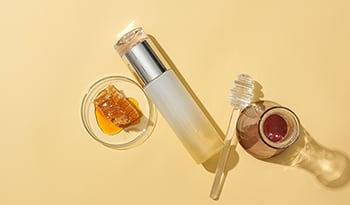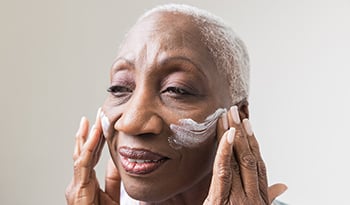Skincare Secrets For Those Who Practice Fasting

Fasting, which is restricting caloric intake for a set period of time, is a common practice that many people use in a variety of different ways, for different reasons. For example, some people practice intermittent fasting for health benefits and weight loss by restricting meals to a set number of hours each day. For others, fasting is performed one day a week, for a few days at a time, or even every other day. Others may fast for religious purposes, or even before a medical procedure, based on a doctor’s recommendations.
Scientific studies have shown a number of health benefits from restricted caloric intake, including improvement in metabolism, blood sugar, weight, cholesterol, and decreased inflammation and aging. With all of these reported effects on the body, you might wonder, what are the effects of fasting on the skin?
The ways in which fasting influences the skin have been relatively less studied, but there are a few key findings that are worth mentioning. By the way, when I’m talking about the effects of fasting on the skin, I’m referring to caloric restriction and its effects on the skin. This is not to be confused with another trend called “skin fasting,” which refers to a different concept in which you stop all skincare products (or adopt a minimalist approach) in order to reset the skin. That’s a topic for another day.
Potential Skin Effects from Fasting
There is still a lot to be learned about how restricted caloric intake affects the skin. Here are some of the key points to know.
The Skin’s Circadian Rhythm
One way in which fasting may affect the skin is by regulating its circadian rhythm. You may have heard of the circadian rhythm in reference to our sleep-wake cycle—it’s like a central clock within our brains that tells us when it’s time to wake up and go to sleep. It is influenced primarily by light, but also by mealtimes. Interestingly, other organs and tissues in our body, including fat tissue and skin, also seem to operate on circadian clocks.
Some studies have shown that certain genes involved in circadian rhythms in the skin are turned on during periods of fasting, but we don’t yet fully understand how that influences the skin. One idea is that if fasting is done in a way that helps align the body’s cycle with its normal circadian rhythms, it can help regulate the immune system and decrease inflammation.
Skin Barrier and Moisture Retention
During times of fasting, research shows that the skin makes less cholesterol. Cholesterol is an important building block in creating the skin barrier, which is essential for maintaining skin hydration. What this means is that the skin can become more dry and prone to irritation during periods of fasting.
Glycation
The major theory behind the benefits of restricted caloric intake is based on the concept that when there is too much sugar in the blood, the sugar gets added onto various proteins in the body, including collagen in the skin. That process is referred to as glycation, and the resulting sugary proteins are referred to as advanced glycation end products (AGEs). AGEs are thought to contribute to aging, both in the body as well as the skin. Chronic caloric restriction has been shown to decrease glycation levels, but more information is needed to understand how other types of fasting affect glycation.
A quick word of caution before we move on. Too much fasting can also have unhealthy effects on the skin. If caloric intake is severely restricted for a long period of time, nutritional deficiencies can occur. This can lead to dry, flaky, irritated skin, inflammation of the tongue, and possibly even easy bleeding, bruising, and coiled hairs. Restricted caloric intake can hinder the ability to stay warm, and the body can develop a thin layer of fine, soft hairs called lanugo, to try to stay warm. Like anything in life, fasting should be done in moderation.
Skincare Tips for Fasting
During times of fasting, be gentle to yourself. Take care of yourself. Fasting is not easy. Here are some tips for caring for your skin while fasting:
- Develop a skincare routine. If you haven’t done so already, this is a good time to start. Creating a dedicated skincare regimen is essential to optimizing your skin health. The skin does better with consistent, regular applications, rather than frequent new and changing products. By becoming diligent with your skincare schedule, it may even help you stick with your fasting plan, and vice versa. In addition, for many people, fasting is a method of self-care and honoring the body. If you’re working on your health and confidence, taking care of your skin should not be forgotten.
- Rest. Remember everything I said above, about circadian rhythms? Mealtime regulation of circadian rhythms is just part of the story—the rest is about getting good sleep at regular, consistent hours. You can optimize sleep by avoiding alcohol and blue light (from televisions, computers, and phones) a couple of hours before going to bed at night.
- Eat healthily. If you fast all day and then binge on sugary, fatty foods, you could wind up causing your skin to have more breakouts, due to higher blood sugar spikes. Make sure to choose healthy vegetables, proteins, and fruits for meals. Skim milk and foods high on the glycemic index, such as starchy, high-carbohydrate foods, can worsen acne.
- Stay hydrated. When you’re not eating, you’re not taking in as many electrolytes as you normally would from food, so your body has a more difficult time staying hydrated. That’s why most people lose a quick few pounds from water weight when they first start restricting their calories. As I mentioned previously, the skin barrier may become more compromised during times of fasting. This makes it harder for the skin to retain moisture, which is another reason why you should try to stay well-hydrated while fasting.
- Use a gentle cleanser. I recommend gentle cleansers instead of harsh or abrasive soaps for everyone, regardless of fasting. However, it is especially important during fasting. Because the skin’s outer lipid barrier may be impaired during fasting, you should avoid soaps that have “detergent-like” effects which could strip the skin barrier.
- Moisturize. Moisturizing is important for maintaining healthy, glowing skin, and it is especially important during fasting. Look for moisturizers that have ingredients like hyaluronic acid, ceramides, dimethicone, or glycerin. Twice daily moisturizing is adequate for most people, but if the skin still feels dry or dull during the day, sometimes more moisturizing is necessary. A lightweight face mist can also serve as an excellent refresher during the day. For moisturizing the body, I recommend creams or ointments instead of lotions. Lotions are thinner and rub in more easily, but they have higher alcohol content and evaporate more quickly, making them less effective as moisturizers. Ointments are clear and greasy. Ointments are the most effective for improving the skin barrier and hydration, but some people don’t like the feeling of ointments on their skin. For the face, creams or serums are ideal options for bringing hydration to the skin.
I hope this helps you to look and feel great while fasting. Good luck!
This blog is not intended to provide diagnosis, treatment, or medical advice. Content provided on this blog is for informational purposes only. Please consult with a physician or other healthcare professional regarding any medical or health-related diagnosis or treatment options. Information on this blog should not be considered as a substitute for advice from a healthcare professional. The claims made about specific products throughout this blog are not approved to diagnose, treat, cure, or prevent disease.
DISCLAIMER:This Wellness Hub does not intend to provide diagnosis...
















































































 Table of Contents
Table of Contents




